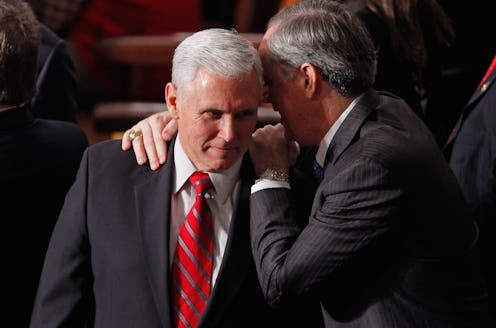News
Mike Pence's Conservative Stance On Women's Rights
Update: On Friday via one simple tweet, Donald Trump confirmed Indiana Gov. Mike Pence is his vice presidential running mate.
Earlier: After he became the newly-minted Republican vice presidential pick, the first thing I wanted to consider was Mike Pence's stance on women's rights.
Real estate mogul and presumptive Republican nominee Donald Trump chose Gov. Pence as his vice president on Thursday. While nothing is expected to be confirmed by Trump's campaign until Friday, and the media has wrongly named running mates before, the conservative Indiana governor's record on women's rights isn't likely to help Trump's so-called "women's problem."
A staunch pro-lifer, Pence is well-known for leading the fight to defund Planned Parenthood in Congress and signing a restrictive anti-abortion measure, which was later blocked by a federal judge. Pence's voting record shows the right-wing politician has rarely championed women's rights.
Prior to being sworn in as Indiana's governor in 2012, Pence served for 12 years as a member of the House of Representatives. During that time, he voted twice against the Lilly Ledbetter Fair Pay Act, which allowed working women to bring pay discrimination charges against their employer after each individual paycheck, as opposed to seeing the statue of limitations run out 180 days after employers made the initial decision on pay rate or salary. Pence also voted against the Paycheck Fairness Act in 2009, which would have amended the Fair Labor Standards Act of the Equal Pay Act.
Additionally, Pence was an aggressive pro-life advocate while in Congress. Along with pushing through an amendment aimed at defunding Planned Parenthood in 2011, Pence also co-sponsored the No Taxpayer Funding for Abortions Act, a bill aimed at redefining the exemption of rape within a ban on federal abortion funding to "forcible rape." Critics worried the bill's modification of language would leave the exemption of rape open to interpretation as cases of attacks involving drugs, alcohol, or verbal threats challenged, according to The Washington Post.
While serving in the House, Pence also voted against raising the minimum wage, expanding health care for children of low-income families, and increasing Section 8 voucher funding, policies aimed at assisting women and low-income families. According to the Department of Labor, 56 percent of those who would benefit from a federal minimum wage increase are women.
Pence continued his attempts to keep Planned Parenthood from government resources after he left his seat in the House of Representatives and was sworn in as governor of Indiana in 2012. A year after Pence became governor, Indiana Planned Parenthood centers were reportedly receiving nearly 50 percent less state funding than they had been in 2005, according to Mother Jones. As a result, five clinics in the state were forced to close.
If Thursday's reports that Trump has chosen Gov. Pence to be his running mate turn out to be true, women's rights and access to safe, legal abortions are unlikely to be major concerns for the Republican Party's 2016 presidential campaign.
